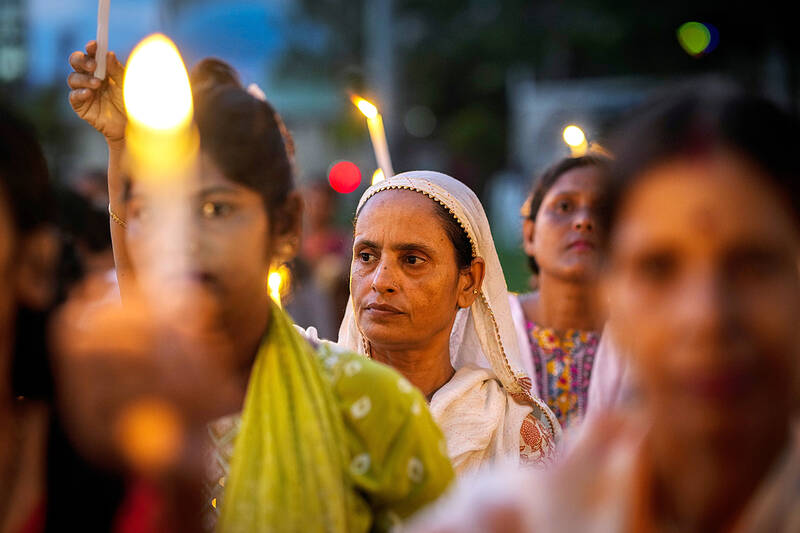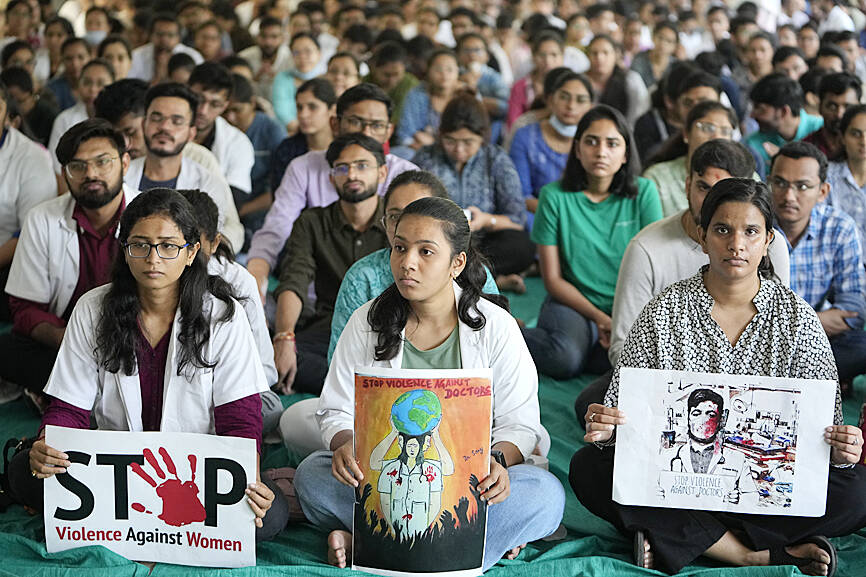Hospitals and clinics across India yesterday turned away patients except for emergency cases as medical professionals began a 24-hour shutdown in protest against the brutal rape and murder of a doctor in the eastern city of Kolkata.
More than 1 million doctors were expected to join the strike, paralyzing medical services across the world’s most populous nation.
Hospitals said faculty staff from medical colleges had been pressed into service for emergency cases.

Photo: AP
The strike, which began at 6am, cut off access to elective medical procedures and out-patient consultations, the Indian Medical Association said in a statement.
The discovery of the 31-year-old doctor’s bloodied body at a state-run hospital on Friday last week sparked furious protests in several cities across the country. Many have been led by doctors and other healthcare workers, but have also been joined by tens of thousands of ordinary Indians demanding action.
In Kolkata, thousands held a candle-lit vigil into the early hours of yesterday morning.

Photo: AP
“Hands that heal shouldn’t bleed,” read one handwritten sign held by a protester in the city.
“Enough is enough,” read another at a rally by doctors in the capital New Delhi.
The murdered doctor was found in the teaching hospital’s seminar hall, suggesting she had gone there for a rest during a 36-hour shift.
An autopsy confirmed sexual assault and, in a petition to the court, the victim’s parents said they suspected their daughter was gang-raped.
One man, who worked at the hospital helping people navigate busy queues, has been detained.
However, Kolkata’s police were accused by an angry public of mishandling the case and the city’s High Court transferred the investigation to the Indian Central Bureau of Investigation to “inspire public confidence.”
Those in government hospitals across several states on Monday halted elective services “indefinitely,” with multiple medical unions in government and private systems backing the strikes.
The Indian Medical Association (IMA) escalated protests yesterday morning with a 24-hour “nationwide withdrawal of services.”
“We ask for the understanding and support of the nation in this struggle for justice for its doctors and daughters,” IMA chief R.V. Asokan said in a statement ahead of the strike.
“The 36-hour duty shift that the victim was in and the lack of safe spaces to rest ... warrant a thorough overhaul of the working and living conditions of the resident doctors,” the IMA said in a statement.
Doctors are demanding the implementation of the Central Protection Act, a bill to protect healthcare workers from violence.
“There is a lack of proper infrastructure,” said 29-year-old Akanksha Tyagi, a resident at the Lady Hardinge Medical College in New Delhi who took part in one of the protests.
“After working for 24 to 36 hours at a stretch, there’s no proper place for us to rest,” she said.
Additional reporting by Reuters

MONEY GRAB: People were rushing to collect bills scattered on the ground after the plane transporting money crashed, which an official said hindered rescue efforts A cargo plane carrying money on Friday crashed near Bolivia’s capital, damaging about a dozen vehicles on highway, scattering bills on the ground and leaving at least 15 people dead and others injured, an official said. Bolivian Minister of Defense Marcelo Salinas said the Hercules C-130 plane was transporting newly printed Bolivian currency when it “landed and veered off the runway” at an airport in El Alto, a city adjacent to La Paz, before ending up in a nearby field. Firefighters managed to put out the flames that engulfed the aircraft. Fire chief Pavel Tovar said at least 15 people died, but

South Korea would soon no longer be one of the few countries where Google Maps does not work properly, after its security-conscious government reversed a two-decade stance to approve the export of high-precision map data to overseas servers. The approval was made “on the condition that strict security requirements are met,” the South Korean Ministry of Land, Infrastructure and Transport said. Those conditions include blurring military and other sensitive security-related facilities, as well as restricting longitude and latitude coordinates for South Korean territory on products such as Google Maps and Google Earth, it said. The decision is expected to hurt Naver and Kakao

LIKE FATHER, LIKE DAUGHTER: By showing Ju-ae’s ability to handle a weapon, the photos ‘suggest she is indeed receiving training as a successor,’ an academic said North Korea on Saturday released a rare image of leader Kim Jong-un’s teenage daughter firing a rifle at a shooting range, adding to speculation that she is being groomed as his successor. Kim’s daughter, Ju-ae, has long been seen as the next in line to rule the secretive, nuclear-armed state, and took part in a string of recent high-profile outings, including last week’s military parade marking the closing stages of North Korea’s key party congress. Pyongyang’s official Korean Central News Agency (KCNA) released a photo of Ju-ae shooting a rifle at an outdoor shooting range, peering through a rifle scope

Australian Prime Minister Anthony Albanese yesterday said he did not take his security for granted, after he was evacuated from his residence for several hours following a bomb threat sent to a Chinese dance group. Albanese was evacuated from his Canberra residence late on Tuesday following the threat, and returned a few hours later after nothing suspicious was found. The bomb scare was among several e-mails threatening Albanese sent to a representative of Shen Yun, a classical Chinese dance troupe banned in China that is due to perform in Australia this month, a spokesperson for the group said in a statement. The e-mail